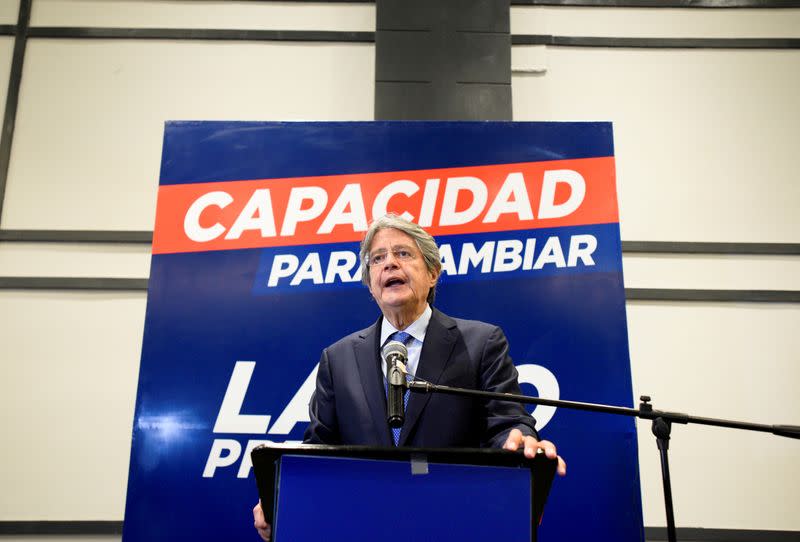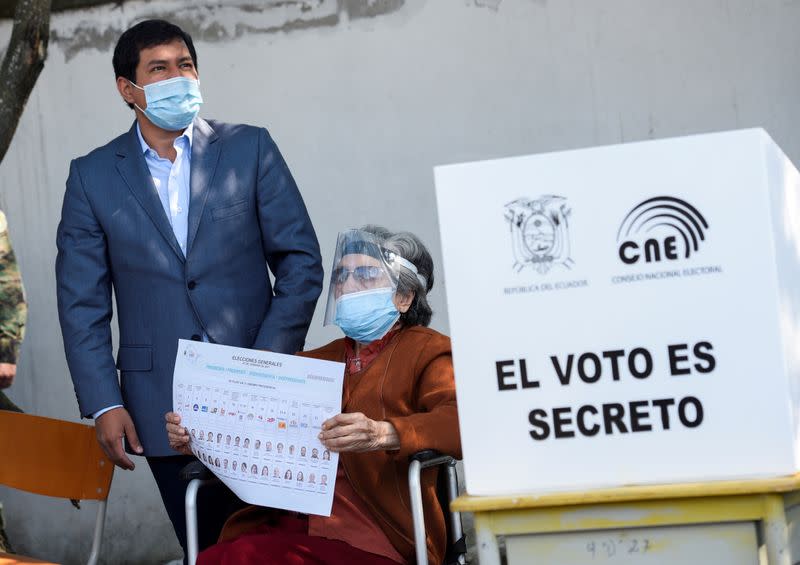Ecuador to choose between socialism and free markets in presidential runoff
By Alexandra Valencia
QUITO (Reuters) - Ecuadoreans on Sunday will choose between a conservative banker and a left-wing economist in a presidential runoff that follows months of debate over whether the country's economic malaise can be best treated through socialism or market-friendly policies.
Polls broadly indicate socialist Andres Arauz, a protege of former President Rafael Correa, with a lead over rival Guillermo Lasso, with many showing a quarter or more of the electorate either undecided or planning to spoil their ballot.
A victory for Arauz would further consolidate a string of leftist electoral victories in South America in the last year, while a win for Lasso would leave Ecuador in the political and commercial orbit of the United States as he seeks to create jobs through foreign investment.
Investors are closely watching the outcome because Arauz has promised to renegotiate the terms of a financing deal with the International Monetary Fund and to vastly expand social welfare spending despite precarious state finances.
"The hope of all Ecuadorians is to move the country forward, but we have doubts about who should govern and what plans you have to apply to get it," said Javier Guevara, a 25-year-old student in the city of Guayaquil, who remains undecided.
"I'm afraid to choose the wrong candidate and have their plans sink us further."
Arauz, 36, won the first electoral round with the 32.7% of the vote thanks to promises to reverse austerity measures and deliver $1,000 to a million poor families - a promise he has downplayed during the runoff vote.
Lasso maintains a pro-market platform.
Since the first round, Lasso has sought to soften his conservative image by offering to combat discrimination based on sexual orientation and even to support a referendum halting oil exploration in the ecologically sensitive Yasuni rainforest.
Indigenous candidate Yaku Perez, who narrowly lost a spot in the runoff, has denounced voter fraud and is calling on supporters to spoil their ballots.
President Lenin Moreno, a former Correa ally, is not seeking a second term. The new president will take office on May 24 for a period of four years.
Low oil prices and the coronavirus pandemic have left a third of the population in poverty and some 500,000 workers without stable employment.
Moreno enacted spending cuts and painful austerity measures in conjunction with a $6.5 billion IMF financing deal, but was unable to revive the economy.
"The key factor will be the candidates' proposals and how they have presented themselves to capture the undecided and null votes," said Blasco Peñaherrera of pollster Market.
Just over 13 million Ecuadoreans registered to participate in the election, which will include biosecurity measures in response to the pandemic.
(Reporting by Alexandra Valencia, writing by Brian Ellsworth; editing by Diane Craft)

 Yahoo News
Yahoo News 

